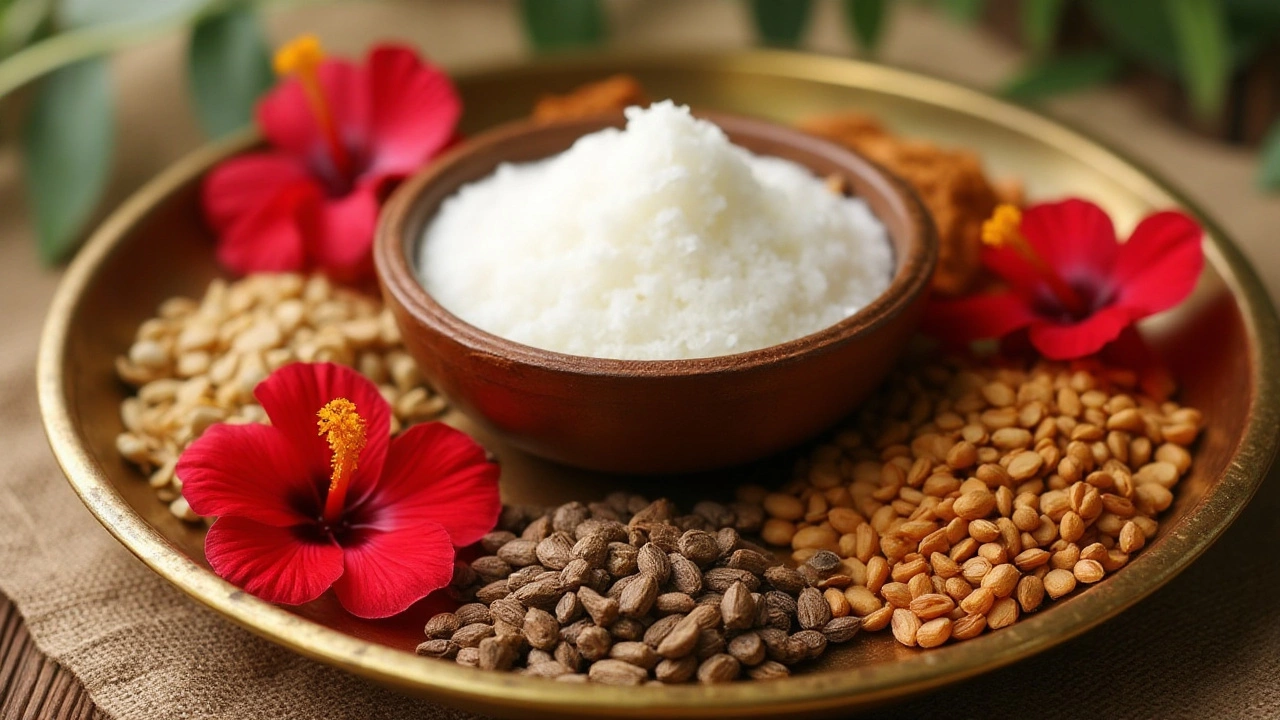- Home
- ::
- Exploring Ayurvedic Solutions for Hair Regrowth

Exploring Ayurvedic Solutions for Hair Regrowth
Throughout history, the ancient wisdom of Ayurveda has served as a beacon for holistic health, providing unique solutions to various ailments, including hair loss. With its origins deeply rooted in India, Ayurveda offers an intriguing approach to regrowth by focusing on balance and natural remedies.
With the modern era's rising interest in holistic and natural solutions, Ayurvedic medicine is receiving newfound attention. This article unravels how a blend of traditional herbs, oils, and time-tested practices promises better hair growth. Let's navigate through the Ayurvedic lens, exploring its age-old techniques for luscious locks.
- Understanding Ayurvedic Principles for Hair Health
- Herbs and Remedies Known for Hair Regrowth
- Scientific Insights into Ayurvedic Practices
- Incorporating Ayurveda into Daily Hair Care
Understanding Ayurvedic Principles for Hair Health
Ayurvedic medicine, steeped in thousands of years of history, provides a comprehensive approach to hair regrowth centering around balance and harmony within the body. According to Ayurveda, the state of one's hair is a reflection of their internal health, emphasizing the importance of balancing the three doshas: Vata, Pitta, and Kapha. Each person has a unique combination of these energies, influencing their bodily characteristics and functions, including their hair. For hair health, the Pitta dosha, which governs our metabolism and digestion, plays a vital role. An aggravated Pitta dosha can lead to several hair problems such as premature thinning, balding, or graying, underscoring the need for effective management.
Ayurvedic practitioners often begin by determining one's dosha balance through consultation, which involves examining lifestyle, health conditions, and even personality traits. This understanding aids in designing personalized treatment plans. Treatments prioritize ingredients that harmonize doshas—Bhringraj, Amla, and Neem are a few such notable herbs. Bhringraj, known as the 'king of herbs', is cherished for its reputation in promoting hair growth and preventing graying. Amla, or Indian gooseberry, is another potent ingredient lauded for its nourishing properties and high vitamin C content, which protects against oxidative stress. Additionally, the practice involves dietary changes aimed at reducing Pitta, incorporating cooling and soothing foods while avoiding hot and spicy options.
"Ayurveda teaches us alignment with nature. The processes that keep Mother Nature in balance are the same processes that keep our bodies in balance," says Dr. Deepak Chopra, a pioneer in promoting Ayurveda worldwide.
A fascinating aspect of Ayurvedic hair care lies in its emphasis on routine. Regular oil massages, known as 'Abhyanga', are highly recommended as they enhance circulation, nourish follicles, and reduce stress, a common modern-day hair loss contributor. Massages typically employ warm oils blended with specific herbs tailored to individual dosha needs. Ayurvedic tradition also considers seasonal changes important for adjusting hair care practices, as doshas can fluctuate with weather, affecting hair health. Beyond physical treatments, mental peace is considered vital. Stress management through yoga and meditation is integrated, showcasing Ayurveda's belief in treating the whole being rather than isolated symptoms.
Embracing the Ayurvedic lifestyle for natural remedies, one is encouraged to establish a strong connection to their environment and body, tuning in to the signals they send. This mindful approach toward health is what continues to attract many to Ayurvedic practices today. For those considering this path, it may be wise to consult with experienced practitioners who can provide authentic guidance rooted in tradition. The holistic journey of Ayurveda not only promises improved hair health but also aims to enhance overall well-being, reflecting its timeless wisdom.

Herbs and Remedies Known for Hair Regrowth
When delving into the world of Ayurveda, one cannot overlook the profound role that nature plays with its bounty of potent herbs. Hair regrowth, a concern shared by many, finds solutions in a variety of Ayurvedic remedies that focus on the innate balance of the body. The beauty of Ayurveda lies in its holistic approach, viewing hair health as a reflection of one's overall wellbeing. Amongst the treasures of nature, herbs like Bhringraj, Amla, and Brahmi stand out for their long-touted efficacy in stimulating hair growth. Bhringraj, often hailed as the 'king of herbs' for hair, is recognized not only for boosting hair growth but also for improving hair texture and color. Traditionally, Bhringraj oil has been massaged into the scalp to rejuvenate hair follicles. Meanwhile, Amla, known for its high vitamin C content and antioxidants, is believed to strengthen hair roots and facilitate faster growth. It is also used to prevent premature graying, a common concern among many.
The magic does not end there. Shikakai has been celebrated for centuries as a natural hair cleanser, promoting follicle health without stripping the hair of its natural oils. Then, there's the calming Brahmi, which many use to soothe the scalp and fortify hair strands, making them less prone to breakage. This plethora of herbs demonstrates Ayurveda's deep understanding of natural ingredients and their individual nuances. Interestingly, modern science offers glimpses into why some of these remedies have sustained their popularity over the years. For instance, a study conducted by the International Journal of Ayurvedic Medicine revealed the potential of Bhringraj in extending the anagen phase of hair, thus promoting regrowth.
"Traditional remedies offer insight into long-term solutions by connecting ancient wisdom with modern-day challenges." - Dr. Namrata Patel, Ayurvedic Practitioner
When we talk about Ayurvedic remedies, their allure also lies in their ability to be easily incorporated into daily routines. Preparing a hair mask using Amla powder or crafting an herbal oil infusion are practices that not only cater to hair regrowth but also bring a sense of tradition and mindfulness to self-care rituals. With a blend of herbs such as Henna, Fenugreek seeds, and the aforementioned names, these hair rituals foster a healthier environment for hair to thrive. In addition to herbs, certain oils like coconut, sesame, and castor oil enhance the potency of these treatments. They act as carriers allowing the herbs' benefits to penetrate deeper, ensuring proper nourishment. Tables of nutritional content consistently remind us of the wealth of vitamins these herbs bring, including hair-healthy components like biotin and vitamin E. Such wisdom empowers individuals to revert to nature, seeking the strength found within its depths.

Scientific Insights into Ayurvedic Practices
For centuries, Ayurveda has been revered for its holistic approach to healing, including a strong focus on hair regrowth strategies. But how does this ancient science measure up against the scrutiny of modern scientific inquiry? Recent studies have begun to delve into the efficacy of specific Ayurvedic applications and herbs, finding intriguing connections between traditional knowledge and contemporary science. Researchers have pointed to the antioxidant and anti-inflammatory properties inherent in many Ayurvedic herbs, which may contribute positively to hair health. The integration of Ayurveda's principles, such as maintaining balance among the body's energies (doshas), resonates with current scientific understanding of stress and its impact on hair loss.
One specific area of interest is the use of Bhringraj, or Eclipta alba. Known in Ayurvedic texts as the 'king of herbs' for hair, Bhringraj has been shown in several studies to not only help in maintaining natural hair color but also to promote hair regrowth. In one particular study published in the Archives of Dermatological Research, extracts of Bhringraj demonstrated better hair growth activity than minoxidil, a common medication used for treating hair loss. Such findings not only highlight the potential of individual herbs but underscore how traditional knowledge can complement scientific discovery in meaningful ways.
"Ayurveda, with its rich history and holistic approach, continues to offer insights that resonate well with modern health seekers," says Dr. Anupama Nambiar, an Ayurvedic practitioner and researcher.
Shikakai, another potent ingredient favored in Ayurvedic treatments, has also shown promising results. Its saponin content is believed to cleanse the scalp of dirt and excess oil without stripping it of natural oils, promoting a healthy environment for hair follicles to thrive. Some studies suggest that the combination of Shikakai with other herbs like Amla can enhance hair texture and strength. When looking into coconut oil, a staple in Ayurvedic hair care for centuries, modern investigations have revealed its ability to penetrate the hair shaft, reducing protein loss and maintaining hair moisture.
Ayurveda's focus on dietary and lifestyle modifications parallel findings in health research indicating that nutrition and stress management can substantially impact hair health. Dietary recommendations within Ayurveda, such as the inclusion of leafy greens, protein-rich legumes, and hydrating fruits, echo contemporary dietary guidelines for maintaining hair integrity. Moreover, yoga and mindfulness practices, integral to Ayurvedic tradition, have been recognized in studies for reducing stress-induced hair loss, emphasizing the intrinsic link between mental well-being and physical health.
Modern Research and Ayurveda
While modern science has only begun to unravel the mysteries of Ayurvedic practices, the interconnections are gaining attention. In a survey conducted in India, individuals who regularly used Ayurvedic hair treatments reported a noticeable thickening of hair over six months. Although such surveys abound with anecdotal evidence, they highlight the importance of conducting more rigorous scientific studies. As scientific inquiry advances, the bridge between modern medicine and Ayurveda continues to build, promising not only validation of age-old techniques but a synergy that incorporates the best of both worlds. This interplay not only promises hope for those seeking natural hair regrowth solutions but also underscores the importance of holistic approaches to health.

Incorporating Ayurveda into Daily Hair Care
Adopting Ayurvedic principles into your daily hair care routine can be a transformative journey towards healthier hair. The beauty of Ayurveda lies not just in its use of natural ingredients but in its holistic approach, emphasizing balance and wellness. Begin your ritual with an understanding of your Prakriti, or body constitution, which influences how you should care for your hair. Vata, Pitta, and Kapha each have unique characteristics, and recognizing your type is key. For instance, those with Vata might have dry, frizzy hair and should focus on hydration, while Pitta types, prone to thinning and graying, may benefit from cooling herbal treatments.
The first step in creating an Ayurvedic hair care regimen is the practice of Champi, or oil massage. An oil massage with specific oils like coconut, sesame, or almond, infused with Ayurvedic herbs like Brahmi, Bhringraj, or Amla, can nourish the scalp and strengthen hair follicles, promoting hair regrowth. Heat the oil slightly and apply it to your scalp, using gentle, circular motions, stimulating blood flow and calming the mind. It's a ritual best done weekly to see noticeable results.
Another vital aspect is the use of natural shampoos and rinses. Replace chemical-laden products with Ayurvedic alternatives that utilize Reetha, Shikakai, and Hibiscus. These ingredients cleanse without stripping the hair of its natural oils. Remember, the focus of Ayurveda is not only on the outer appearance but also on internal wellness. Therefore, integrating a balanced diet, rich in proteins, vitamins, and minerals, can complement your external regimen. Foods rich in Omega-3 fatty acids, like flaxseeds and walnuts, can significantly aid in nourishing your hair internally.
"Ayurveda emphasizes the harmony of body, mind, and spirit, which must be in sync for success across beauty regimens, including effective hair care," says Dr. Vasant Lad, a reputed Ayurveda practitioner and teacher.
Ayurvedic hair masks can also play an important role. You can prepare these masks at home using ingredients like fenugreek, yogurt, and honey, which provide deep conditioning benefits. Apply the mask to your hair from root to tip, leave it for about an hour, and rinse thoroughly. This nourishes the scalp, strengthens roots, and enhances shine.
To maintain hair health according to Ayurveda, establish a routine that aligns with nature's cycles. For instance, trimming hair on full moon days is believed to enhance regrowth and vitality. Also, avoid excessive heat styling and exposure to pollution, as these stressors can disrupt the natural balance necessary for strong, lustrous hair.
Supplementary Practices
Apart from topical treatments, engage in practices like yoga and meditation, which reduce stress, a known factor for hair loss. Pranayama, or breathing exercises, can improve circulation, potentially bolstering hair health. Ayurvedic herbs, in supplement form, such as Ashwagandha and Triphala, can be consumed to balance doshas and support digestive health, which reflects in the quality of your locks.
This harmonious blend of ancient wisdom and consistent practice could lead to substantial improvements in not only the appearance but the intrinsic health of your hair. By nurturing both the outer and inner self, you align with Ayurveda's goal of holistic wellness, resulting in hair that looks and feels nourished from root to tip.

 Health and Wellness
Health and Wellness





Write a comment